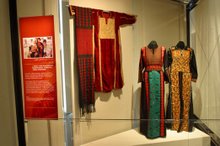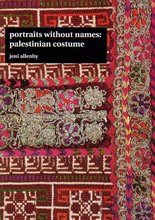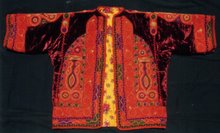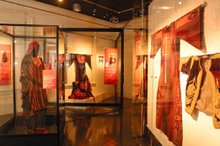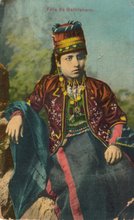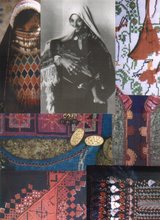
Why does this story / issue seem oh so familiar to everyone at the Palestine Costume Archive lol:
Gaza children’s images of war censored under pressure from US Israel lobby
Nora Barrows-Friedman
The Electronic Intifada
13 September 2011
Pro-Israel organizations pressured an Oakland children’s museum to cancel an upcoming exhibition of drawings made by Palestinian children in the Gaza Strip. Community leaders say the shutting down of the exhibition is the result of a disturbing — and well-funded — campaign to silence Palestinian voices across the US.
On 8 September, just two weeks before the exhibition was set to open to the public, the board of directors of the Museum of Children’s Art (MOCHA) announced that they had canceled “A Child’s View of Gaza.” The board shut down the show due to pressure from “constituents,” according to a statement made by Randolph Bell, the board’s chairman, in the San Francisco Chronicle (“Oakland museum cancels Palestinian kids’ war art,” 9 September 2011).
The show was curated in partnership with the Berkeley-based non-profit group Middle East Children’s Alliance (MECA), which has been working for 23 years to advocate for Palestinian, Iraqi and Lebanese children’s rights. Barbara Lubin, MECA’s executive director, told The Electronic Intifada that it was “upsetting and infuriating” that the show was canceled, but she wasn’t surprised.
“Anybody who knows this issue knows that the Jewish Federations of North America and the Jewish Council for Public Affairs have launched a multi-million dollar project to combat what they call the ‘delegitmization’ of Israel,” Lubin said. “They try and suffocate the boycott, divestment and sanctions movement and censor Palestinian cultural initiatives. What they’re doing is financing the work of silencing and shutting down anyone who wants to talk about what’s really happening to Palestinians.”
The Chronicle also reported that the board of directors at MOCHA vaguely cited the “inappropriate nature” of the content of the children’s drawings in their decision to shut down the exhibit. Some of the Palestinian children’s illustrations show tanks, guns and explosions, but the board’s assertion that these images are “inappropriate” enough to censor is clearly selective.
In years past, MOCHA had successfully exhibited strikingly similar artwork by children in Iraq who drew from their personal experiences of war following the 2003 US-led invasion and subsequent occupation. Another exhibition several years ago showed artwork by children made during the Second World War that “featured images of Hitler, burning airplanes, sinking battleships, empty houses and a sad girl next to a Star of David,” the Chronicle added.
Lubin said that the difference in this context is simple: “The pro-Israel groups are afraid that people will start understanding what’s really going on with Israeli policy through seeing exhibits like the one we put together. They don’t want people to know that Palestinian children are suffering. They’re afraid of us hearing that other side. For 63 years we’ve heard one side in this country and around the world, and it’s time for the other side to be heard.”
Stretching Israel’s siege from Gaza to Oakland
The censored drawings were created through local children’s mental health initiatives in Gaza immediately following Israel’s attacks in the winter of 2008-09, during which approximately 1,400 Palestinians, including more than 300 children, were killed.
Ziad Abbas, associate director of MECA, told The Electronic Intifada that several art-based organizations in the Gaza Strip began working with traumatized children in an effort to help them channel their fears, anger and trauma through artistic expression. Those drawings resulted in the collection of artwork that was to be showcased at the children’s museum.
“The art projects were born out of a necessity to try to reduce the impact and effects of the attacks which killed hundreds of children in Gaza. These drawings came from that kind of therapy to express their feelings,” he said.
Abbas added that the child artists were thrilled that their work had “broken Israel’s siege on Gaza” when the drawings made their way to a museum halfway across the world.
“It was important for these children to know that their voices were going to be heard in Oakland. However, they didn’t expect the siege to stretch all the way from Gaza to California, which is essentially what happened when MOCHA canceled the exhibit due to pressure from these groups,” Abbas said.
Major donors: “Funding was not jeopardized”
Upon investigation, it emerged that those “constituents” who got the ear of MOCHA’s board chair included pro-Israel public relations institutions with extraordinarily large budgets and organized community outreach programs. In the Bay Area, these organizations include the Jewish Community Relations Council (JCRC), a subsidiary branch of the Jewish Council for Public Affairs (JCPA); and the local chapter of the Jewish Community Federation (JCF), which operates under the umbrella of the Jewish Federations of North America (JFNA).
The JCRC and the JCF both receive substantial funding from the Walter & Elise Haas Fund, which has also funded MOCHA.
The fund, based in San Francisco, is a major donor to arts, science, social justice and Jewish organizations around the Bay Area across the political and cultural spectrum. MOCHA received $30,000 in grants from the Haas fund in 2011 (Recent grantmaking: The Arts,” Walter & Elise Haas Fund website, accessed 9 September 2011).
However, a program coordinator with the Walter & Elise Haas Fund told The Electronic Intifada that their staff had talked to the museum about possible public concern with the exhibit, but that the art show “was their decision and their funding was not in any way jeopardized with their doing it.” Pam David, the executive director of the Haas Fund, declined to comment for this article.
John Patchner, communications director for the East Bay Community Foundation — which has awarded tens of thousands of dollars in grants to MOCHA over the years — told The Electronic Intifada that they had “not been contacted by anyone in connection with the cancellation of the exhibit and we’re currently seeking additional information from the Museum of Children’s Art.”
But there are many other foundations that support MOCHA. And in August at least one pro-Israel online campaign encouraged the general public to directly contact MOCHA funders, and published a list of various foundations, in a bid to cancel the children’s art exhibition.
“No fight is too small” for pro-Israel groups
Whether or not MOCHA’s funders were directly intimidated by pro-Israel groups in the Bay Area, it’s certain that top leadership from groups such as the JCRC had a hand in shutting the exhibit down. The JCRC has repeatedly thwarted art and cultural initiatives in the Bay Area which highlight the Palestinian struggle, and has used the guise of “fighting anti-Semitism” to censor alternative voices.
At San Francisco State University in 2006, a proposed mural in honor of the late Palestinian-American intellectual Edward Said was attacked by the JCRC, which helped convince the university administration that the mural sent a “chilling” and threatening message to Jewish students and therefore should be blocked (“SFSU president keeping Jews safe with mural censure,” Jewish Weekly, 6 October 2006).
In 2007, the JCRC also worked hand-in-hand with the Anti-Defamation League (ADL), one of the largest and most influential Israel lobby organizations in the US, to force the San Francisco Arts Commission to exert pressure on a local grantee of theirs, an organization for at-risk youth in San Francisco. A mural, planned and painted by Homies Organizing the Mission to Empower Youth (HOMEY), depicted symbols of Palestinian struggle and resistance, including a Palestinian woman with a kuffiyeh (the traditional checkered headscarf) and a crack in the wall that resembled historic Palestine.
The JCRC and the ADL put pressure on the Arts Commission to make the artists omit or modify some of the images after claiming that the symbols were anti-Semitic and “out of touch with the overwhelming majority of Jews,” as reported in the San Francisco Examiner (“Controversial mural to be altered in S.F.,” 20 September 2007).
The two organizations also worked together to stifle free speech on college campuses in the Bay Area, censoring academic lectures by attempting to conflate criticism of Israeli policy with anti-Semitism. Other pro-Israel groups, backed by the ADL, have pressured faculty boards to deny tenure to university professors who openly criticize Israeli policies.
Following MOCHA’s cancellation of the exhibit, Rabbi Doug Kahn, executive director of the JCRC, admitted to the online blog Muzzlewatch (a project of Jewish Voice for Peace) that he was “working closely with the Jewish Federation of the East Bay [which is part of the JFNA]” and “shared with the leadership of MOCHA our concerns about the inappropriateness of this exhibit given the fact that MOCHA — an important and valued community institution — serves very young children” (“Oakland children’s museum cancels Palestinian children’s art exhibit under pressure from local Jewish groups,” 10 September 2011).
Rabbi Kahn refused to respond directly to The Electronic Intifada’s questions via phone, but emailed a statement from the JCRC on 12 September. Entitled “Jewish Community Applauds Children’s Art Museum’s Decision on Exhibit,” it alleges that the art show “contains violent images that dehumanize an entire ethnic and religious population.”
The JCRC adds that MOCHA’s leadership “recognized the negative effect that this inflammatory exhibit would have on young children, Jewish and non-Jewish alike,” adding that the drawings could “potentially create an unsafe atmosphere for Jewish children.”
However, nowhere in the children’s drawings are there anti-Semitic images or phrases. The only Stars of David that are drawn are the ones that Israel itself has put on its flags, F16 bomber jets, tanks and soldiers’ uniforms — ubiquitous Israeli national symbols that any Palestinian child living under Israeli military occupation would see on a daily basis, especially during times of wanton attacks.
The cancelation of the children’s exhibition was celebrated as a victory by pro-Israel groups. On 7 September, the day before MECA was informed by the museum’s board of directors that the exhibit had been canceled, the Jewish Federation of the East Bay (JFEB) had already received information that the show was shut down — and boasted about the cancellation of the exhibit on its official twitter account.
JFEB (@JFEDeastbay) tweeted: “Great news! The ‘Child’s view from Gaza’ exhibit at MOCHA has been canceled thanks to some great East Bay Jewish community organizing.”
Pro-Israel groups to “pressure civic leaders” in new $6M initiative
The timing of Kahn’s determination to pressure the MOCHA board is significant. Just eleven months ago, the JFNA pledged to invest $6 million in a new, three-year initiative they call the “Israel Action Network.”
Working alongside the JCPA — of which the JCRC, Kahn’s organization, is a subsidiary — the Israel Action Network “is expected to serve as a rapid-response team charged with countering the growing campaign to isolate Israel as a rogue state akin to apartheid-era South Africa — a campaign that the Israeli government and Jewish groups see as an existential threat to the Jewish state … The network will monitor the delegitimization movement worldwide and create a strategic plan to counter it wherever it crops up” (“Federations, JCPA teaming to fight delegitimization of Israel,” Jewish Telegraphic Agency, 25 October 2010).
The JFNA stated that this new campaign would seek to influence “civic leaders,” and said that it would be fully staffed and “up and running” by 1 January 2011.
According to their recent tax forms, the JFNA’s investment of $6 million in this new campaign should not be a financial burden — they listed more than $197 million in total assets between June 2009 and June 2010 (Return of organization exempt from income tax, 2009, 2009-2010 [PDF]).
The fact that these enormous, well-funded Israeli advocacy organizations have turned their attention to a singular, modest children’s art exhibition in Oakland highlights the Israeli lobbies’ tireless efforts to silence Palestinian expression. Deborah Agre of MECA agreed, saying that “no fight is too small” for these groups.
MECA’s Barbara Lubin added that the attack on this children’s art show is just one in a long line of such campaigns.
“But this is particularly saddening to me because these are voices of children,” Lubin said. “And as I said to the head of the board of directors at the museum, MECA loses, MOCHA loses, but more importantly, the children from Gaza lose the most. They’ve always been the ones to lose the most. Not only do they have to live through these bombings and the siege, but then when they try to express their experiences through art, they’re shut down.”
“There’s only one winner in all of this,” Lubin added, “And that is the Zionist lobby who intimidate, harass and do everything they can to make it impossible for people to have these kinds of exhibits.”
The child artists in Gaza are upset that their work has been censored, according to MECA staff.
MOCHA’s board of directors: supporting all children, or just some?
According to its tax documents, accessed from public records, it is clear that MOCHA is a grassroots organization highly dependent on funding from outside grants and foundations. MOCHA listed just over $700,000 in contributions and grants in 2009 — whereas salaries and employee benefits accounted for approximately double that amount. Their fee-based children’s art programs bring in additional revenue of just under $1 million for that year.
If pro-Israel lobbyists indeed placed threatening calls to foundations that support MOCHA, it is understandable that they could feel frightened by the potential loss of money for the next fiscal year and would therefore bend to pressure by these outside groups. But MOCHA may have violated its own mission statement in doing so. On its tax forms, MOCHA states its mission is “to ensure that the arts are a fundamental part of the lives of all children.
Ziad Abbas said that it’s wrong for the board of directors to put conditions on that support. “Do they really support all children, or just certain ones? Certainly, in this situation, the Palestinian children who made this artwork are not being supported at all,” he remarked.
The Electronic Intifada asked whether the children in Gaza had been informed that their exhibition was shut down, and what their reaction was to the news. Abbas explained that he had just received a call from one of the young artists in Gaza who saw MECA’s press release on the Internet that explained that the show was canceled.
“He was extremely disappointed, and the other children were obviously shocked and sad as well,” Abbas replied. “It’s upsetting to them to hear that a children’s art museum across the world decided that their personal [narratives] are offensive, and then silenced their voices and artwork. When you hear about an art museum that has violated its own mission to censor children’s artwork and children’s artistic expression, it’s extremely disappointing.”
Community support is out in force
Following Thursday’s announcement by the MOCHA board of directors, MECA has been flooded with phone calls and emails from supporters not only just across the Bay Area but worldwide who are appalled at the shutting down of the children’s art show. And Lubin said that while outrage at the museum is understandable, the institution is not the enemy.
“MOCHA is very dear to our hearts,” Lubin emphasized. “We love this organization and respect the work they do. It’s an essential institution in the Bay Area. Our anger is not at the people who work at MOCHA; rather, our anger is at the board who do not have the courage to stand up to this kind of intimidation from the pro-Israel groups. We’re asking people to direct their anger at the board and at the Zionist organizations who do this kind of muzzling. But certainly not at the organization itself.”
MECA has started an email action campaign in an effort to counter-pressure the board of directors with support and gratitude for hosting the Palestinian children’s artwork. They are also asking people to come to the gallery on 24 September, on the planned opening day of the exhibition, in a show of support for the show even if it remains canceled.
Meanwhile, Lubin and the MECA staff are busy figuring out alternative venues for the exhibition. “We’re not sure where the show will be yet, but we’ll continue to work on seeing that these voices are heard and that these pictures are shown. People want to do something, and have been offering space in their homes, shops and even in schools,” Abbas said. “They won’t shut down these children’s voices.”
Nora Barrows-Friedman is an award-winning independent journalist, and is a staff writer and editor for The Electronic Intifada. She also writes for Inter Press Service, Al Jazeera, Truthout and other outlets, and regularly reports from Palestine.




